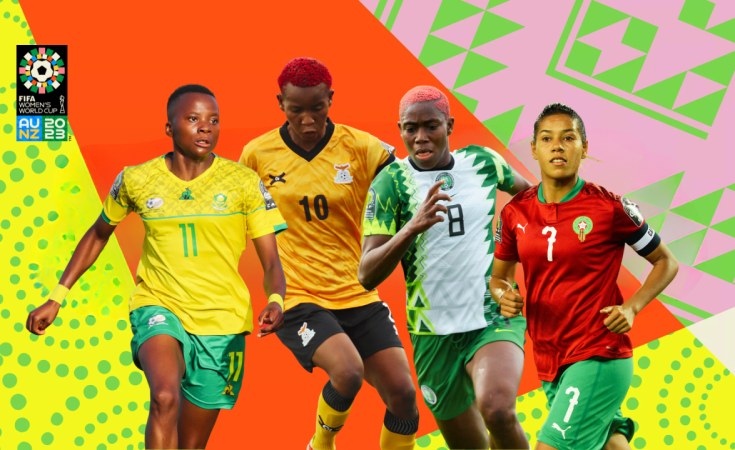Nigeria, South Africa and Morocco booked their places in the round of 16 of the women's football World Cup, as Germany, Brazil and Canada packed their bags to head home at the conclusion of the group stages on August 3rd 2023. That's three of the top 10 teams from the Fifa world rankings out in the group stage, and the US only runners-up in their group. This is the first time that three African teams have made it to the second round and a great indicator that the quality of the game is improving.
For me, as a scholar of sport science with a strong research focus on African football, it's encouraging to see how the expansion of the tournament from 24 to 32 nations seems to have opened up opportunities for new teams raring to announce their presence on the world stage. African teams, among other non-traditional power houses like Colombia and Jamaica, have indeed showed up to unsettle any pre-tournament expectations.
Given that women's football is a relatively new phenomenon in many African countries, the accomplishment of the women's teams sends a powerful signal to their respective national federations, the Confederation of African Football and governments that they deserve more attention and investment.
Indeed, women's football could be a great avenue for African countries to earn global footballing recognition just as it has been in age group competitions.
Debutantes cause a stir
Morocco's Atlas Lionesses, who are in the tournament for the first time, are carrying the weight of being the first women's team from the Arab world to play on the World Cup stage. Ranked 72nd coming into the world cup, they caused ripples when they beat Colombia and South Korea 1-0 to edge out Germany as the runners-up in group H.
Their two victories have raised their confidence as they move to the round of 16. This sets up a mouth-watering clash with France, who are in devastating form.
Out of the eight debutantes in Australia and New Zealand, the Atlas Lionesses are the last women standing. Their success is a credit to FIFA broadening opportunities for non-traditional football dominant regions after a very successful 2019 World Cup tournament by increasing slots from 24 to 32. The Moroccan government also deserves credit for investment in a football academy that seeks to produce international quality footballers from both boys and girls. The recent high profile successes for both the men's and women's Moroccan teams are carefully planned and executed, and not just an accident or coincidence.
South Africa overcome pre-tournament chaos
South Africa's Banyana Banyana team (ranked 54th worldwide), who lost all three of their matches in the 2019 group stages, secured a place in the last 16 with their first ever Women's World Cup win - a thrilling 3-2 victory over Italy - and drawing with Argentina 2-2. One player who has stood out is Thembi Kgatlana, who has scored twice and assisted on two goals.
The reward for South Africa's progress is a clash with the Netherlands. Having beaten a European team on their way to the round of 16 should provide a measure of confidence to Banyana Banyana. The South African team seem to have put the turbulent pre-tournament preparations, including pay disputes and build-up match boycotts, behind them, as results and joyful dances show.
The Super Falcons are flying
The other African women's team to advance is Nigeria, ranked 40th by Fifa before the tournament. The team has surpassed expectations in an extremely difficult Group B to qualify for the last 16 for a second consecutive World Cup.
The underdog Super Falcons drew with Canada 0-0, beat Australia 3-2 and drew with Republic of Ireland 0-0 to emerge runners-up in Group B. In the process, they edged out the current Olympic champions, Canada, at the group stage of the tournament. They remain unbeaten.
The Nigerians have done well, given that they were reportedly on the verge of boycotting matches over pay and conditions. They are now set to clash with England, the European champions, in the battle of the unbeaten!.
Nigeria, the nine-time African champions, have the experience and strength to cope with the marauding Lionesses, who are hitting their stride at the right time after thrashing China 6-1 to head their pool table.
Ready to compete
Three African teams, Nigeria, South Africa and Morocco, have made the continent proud by qualifying for the knock-out stage of the Women's World Cup. Their message is, "We are here to compete". Zambia have departed the stage with heads held high as they finished third in their group after beating Costa Rica 3-1.
The self-belief and confidence, as well as the technical and tactical astuteness displayed by the African teams, shows that their opponents cannot take them lightly. Indeed, Netherlands, England and France are all in for tough battles.
Wycliffe W. Njororai Simiyu, Professor and Chair of Kinesiology and Health Science, Stephen F. Austin State University


